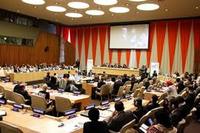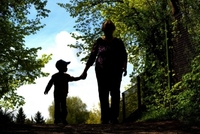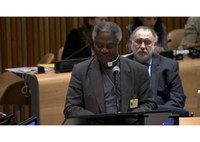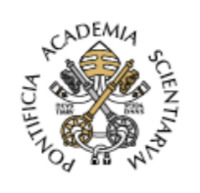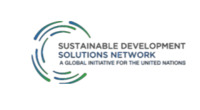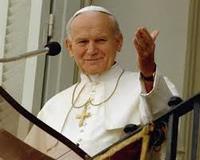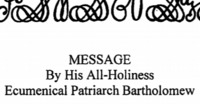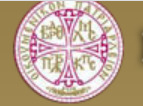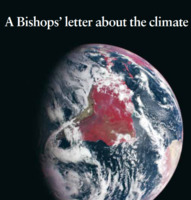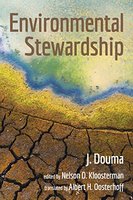Search
174 items
-
Sikh Faith Statement on the Environment
This Sikh faith statement on the environment, based on the 1995 Windsor Statements, is posted on the Interfaith Center for Sustainable Development. Below is the introduction to the statement:
"The Sikh scripture, Guru Granth Sahib, declares that the purpose of human beings is to achieve a blissful state and to be in harmony with the earth and all creation. It seems, however, that humans have drifted away from that ideal. For the earth is today saturated with problems. It is agonizing over the fate of its inhabitants and their future! It is in peril as never before. Its lakes and rivers are being choked, killing its marine life. Its forests are being denuded. A smoky haze envelops the cities of the world. Human beings are exploiting human beings." -
Christian Ecology
Interfaith Center for Sustainability Development posted a Christian ecology statement, based on the 1995 Windsor Statements, on their website. The following is an excerpt discussing the challenges that have persisted over time with regard to the care for creation:
"In the words of the Orthodox Patriarchate, ‘This may well mean that just as a shepherd will in times of greatest hazard lay down his life for his flock, so human beings may need to forego part of their wants and needs in order that the survival of the natural world can be assured.'
The challenge to all Christians is to discover anew the truth that God’s love and liberation is for all creation, not just humanity, and to seek new ways of living that restore balance and hope of life to the endangered planet." -
Catholic Views on Climate Change - a statement from the Catholic Bishops of Australia
The Catholic Bishops of the Climate Institute, Australia created a statement on climate change. The statement emphasizes various responsibilities of individuals and entities that are necessary to provide a safe and healthy environment for all parts of the world. They also warn against further ecological destruction for future generations. -
Pope Benedict XVI on the Environment
The following website contains from quotes from Pope Benedict XVI from a book published in 2012 by Our Sunday Visitor called: The Environment by Pope Benedict XVI. Salient messages include the inter-connectedness of humans and the environment, a call to protect and care for the Earth, the need to alleviate environmental justice, and actions that can foster sustainability. -
Engaged Organizations: Center for Earth Ethics at Union Theological Seminary
The Center for Earth Ethics maintains a vision of world value that is based on the sustained well-being of humans and the planet. Their mission also includes policy change that supports their vision. Their four core programs that support this vision and mission are: Eco-Ministry, Environmental Justice and Civic Engagement, Original Caretakers, and Sustainability and Global Affairs. -
Presentation by Cardinal Peter K. A. Turkson of the Encyclical Laudato si’ in the ECOSOC Chamber
Cardinal Peter K. A. Turkson gave a presentation about Laudato si' at the United Nations Economic and Social Council (ECOSOC) Chamber on June 30, 2015. He emphasized that the environment, our common home, can not be considered in isolation, but rather is a product of integral ecology. Midway through the presentation, the question of the meaning of life is broached, asking the audience to ponder how the earth should be left for future generations. -
Remarks by Cardinal Peter K. A. Turkson on the Encyclical Laudato si’ to Child-Focused Agencies
Cardinal Peter K. A. Turkson addressed child-focused agencies at UNICEF House on June 30, 2015. His message is about the relevance of Laudato si' encyclical with regard to children and our common home. He urges individuals to contemplate the negative impact of climate change and how this will impact the future for our children. -
Statement by Cardinal Peter K. A. Turkson at the High Level Event on Climate Change
Cardinal Peter K. A. Turkson provides a statement on climate change at the United Nations High Level Event on Climate Change on June 29, 2015. He emphasizes that the plight of the poor and the fragility of the planet are intimately related. As stewards of the Earth, he therefore greatly urges individuals to make courageous choices in order to reverse the trend of global warming. -
Climate Change and the Common Good: A Statement of the Problem and the Demand for Transformative Solutions
The Pontifical Academy of Social Sciences prepared the following statement on climate change. It covers a wide range of associated sustainability issues. Various suggestions for societal interventions are also included within the statement. -
Declaration of Religious Leaders, Political Leaders, Business Leaders, Scientists and Development Practitioners
Business and political leaders, and scientists from around the world have congregated at the Pontifical Academies of Sciences and Social Sciences to address the climate change crisis. The introduction to the declaration is stated below:
"We the undersigned have assembled at the Pontifical Academies of Sciences and Social Sciences to address the challenges of human-induced climate change, extreme poverty, and social marginalization, including human trafficking, in the context of sustainable development. We join together from many faiths and walks of life, reflecting humanity’s shared yearning for peace, happiness, prosperity, justice, and environmental sustainability.
We have considered the overwhelming scientific evidence regarding human-induced climate change, the loss of biodiversity, and the vulnerabilities of the poor to economic,social, and environmental shocks." -
Address at the United Nations Climate Change Conference given by H.E. Archbishop James Patrick Green
H.E. Archbishop James Patrick Green provides a statement on the impact of climate change on poverty at the United Nations Conference in Lima, Peru on December 10, 2014. He discusses the interdependence of humans and the Earth. He emphasizes Pope Francis's call for intervention to fight against global warming in order to protect the planet and, in particular, those at the poverty level. -
Common Declaration on Environmental Ethics
On June 10, 2002, Pope John Paul II and Ecumenical Patriarch Bartholomew I issued a declaration on the environment. The introduction to the declaration is stated below:
"We are gathered here today in the spirit of peace for the good of all human beings and for the care of creation. At this moment in history, at the beginning of the third millennium, we are saddened to see the daily suffering of a great number of people from violence, starvation, poverty and disease. We are also concerned about the negative consequences for humanity and for all creation resulting from the degradation of some basic natural resources such as water, air and land, brought about by an economic and technological progress which does not recognize and take into account its limits." -
Global Climate Change A Plea for Dialogue Prudence and the Common Good
A Statement of the United States Conference of Catholic Bishops was issued on June 15, 2001. This document covers a multitude of current environmental problems and the resulting negative impact on populations around the world - especially with regard to indigent populations. It stressed the connectivity of human behavior and it's impact on the planet. -
Message by His All-Holiness Ecumenical Patriarch Bartholomew to the United Nations Conference of the Parties (COP 24) (Poland)
Ecumenical Patriarch Bartholomew I of Constantinople addressed the United Nations of the Parties (COP 24) in Poland, December 3-14, 2018. He emphasized the collective responsibility among all citizens to alleviate the climate problems. One key point includes the urgency to focus on lighter carbon footprints to preserve the Earth to assist in alleviating poverty and suffering.
-
Keynote Address by His All-Holiness Ecumenical Patriarch Bartholomew at the Arctic Circle Assembly
Ecumenical Patriarch Bartholomew I of Constantinople addressed the Arctic Circle Assembly in Reykjavik, October 13, 2017. Below is a section of the keynote address, focusing on the impact of climate change with regard to the Arctic Circle:
"Scientists tell us that the Arctic is a vibrant image and vivid mirror of the state of our planet as a whole. For scientists, the Arctic is the barometer of the globe's environmental health. The ecological misdeeds committed in other regions – including chemical contamination and nuclear radiation – are clearly evident in the Arctic environment. Above all, the dramatic rise in global temperatures is having a palpable effect on the Arctic landscape. Nevertheless, so many industrial societies and activities that cause climate change are often blind to the consequences of their behavior. But here, in the Arctic Circle, it is possible to see all manner of things so much more clearly. When we visit this pristine part of the planet, we cannot hide our eyes, either from the beauty of God’s creation or from the changes which human folly has generated. Nor can we avoid pondering the terrible consequences for the remainder – and the future – of the world, if glaciers continue to melt and sea-levels continue to rise." -
Common Declaration on Environmental Ethics
Pope John Paul II and the Ecumenical Patriarch His Holiness Bartholomew I delivered a speech titled Common Declaration on Environmental Ethics on June 10, 2002. Below is the introduction within the declaration, focusing on the current state of the poor and the consequences of natural degradation:
"We are gathered here today in the spirit of peace for the good of all human beings and for the care of creation. At this moment in history, at the beginning of the third millennium, we are saddened to see the daily suffering of a great number of people from violence, starvation, poverty and disease. We are also concerned about the negative consequences for humanity and for all creation resulting from the degradation of some basic natural resources such as water, air and land, brought about by an economic and technological progress which does not recognize and take into account its limits." -
A Bishops’ Letter about the Climate
Below is a section of the introduction from A Bishops’ Letter about the Climate, which covers a multitude of critical environmental issues, from the 2014 Bishops' conference:
"We have lived with reports and forecasts of climate change since the 1980s. Our climate is the result of the interaction of complex systems and there is often a great distance between cause and effect in terms of both space and time. There are uncertainties and a lack of clarity. However, the knowledge we possess today does not allow us to postpone until tomorrow
what needs to be done now. Our human climate impact must decrease for the sake of the earth, for the sake of the world that God so loves that God gave us Jesus Christ." -
Our Moral Opportunity on Climate Change
On November 3, 2017, the New York Times posted an article by Justin Welby, the archbishop of Canterbury and primate of the Church of England, discussing some of the devastating weather-related disasters that had occurred at that time and how climate change factored into the tragedies. Below is one section of the article, discussing responses of various faith groups with regard to these events:
"Indeed, even amid the hurricane-caused devastation and despair of recent weeks, I have seen seeds of hope. Different expressions of the Christian faith are freshly united around the need to care for our common home. The Catholic, Anglican and Orthodox Churches just came together with the World Council of Churches to celebrate a month long Season of Creation. During this season, people all around the globe prayed and acted to address climate change and to protect the earth." -
The world is our host: A call to urgent action for climate justice
Anglican Bishops from around the world discuss various environmental complications resulting from climate change. They provide a list of initiatives of commitment that they have pledged as a church, some of which include strengthening collaboration among partners, developing and distributing educational resources and liturgical materials, and strengthening of ethical investment guidelines. They also list actions that individuals can take to support their mission. -
Episcopalians Confronting Climate Change
This article discusses American Episcopalians' concern over climate change and the impact with regard to those facing poverty. The introduction to the article is stated below:
"In September 2011, the House of Bishops in the Episcopal Church, attending a meeting in Quito, Ecuador, sent a pastoral letter to Episcopal clergy worldwide expressing 'mounting urgency' to address climate change within church membership. The letter argued the critical need for Christians to care for all of God’s creation and urged that justice be sought for the poor, who it said will suffer most from climate change." -
The Hope We Share: A Vision For Copenhagen
The Anglican Communion Environmental Network addressed the United Nations Framework Convention on Climate Change (UNFCCC)
Conference Of Parties (COP) Meetings, the Fifteenth Session, held in Copenhagen, Denmark in December 2009. They lament the consequences of environmental human footprints, some of which include the lack of drinkable water in various parts of the world, the increased difficulty to grow crops due to the water shortages, rampant consumerism, and subsidies for fossil fuels. -
Lutherans Reflect on Climate Change Conference in Copenhagen
This article discusses some of the sentiments regarding proceedings from the 2009 United Nations Climate Change Conference in Copenhagen. While some attendees expressed disappointment in the outcome, others were more optimistic about steps which may lead to more effective action for climate change in the future. The following excerpt provides a brief description of the event:
"More than 3,000 ELCA members, along with a coalition of U.S. faith leaders, sent some 20,000 postcards to President Barack Obama, urging him to be at the meeting, she said. Obama attended the conference and urged leaders of Brazil, China, India and South Africa to join the United States 'to fund developing nations' projects to deal with droughts,
floods and other impacts of climate change, and to develop clean energy,' among other agreements, according to a U.N. news release." -
Why Lutherans Care for Creation
This article discusses how various concepts of Lutheran theology are woven into ecological messages with regard to God as creator, human interactions, and ways of worship. The following is a section from the introduction of the article, emphasizing human responsibility towards care for the Earth:
"For Christians, care of the Earth is not an 'environmental cause.' Rather, it is central to our holy calling to treasure the Earth and to care for it as our common home, fully integrating creation-care into our love of God and neighbor. Without sacrificing the transformational effects of the 16th-century Reformation, we are called to embrace an eco-reformation that will re-examine and rethink how we read the Bible, how we can expand the scope of our theology, how we can reconfigure our personal vocation and our common ethic, how we worship, how we organize our church life together, and how we understand ourselves as creatures within creation as a whole. This call to continuing reformation is for the whole church, not solely for the committed. Earth care is not an add-on. It is not just for those who happen to be interested in it. It is a call for all Christians to participate in this great work of our time." -
The Coalition on the Environment and Jewish Life
The Coalition on the Environment and Jewish Life (COEJL) is a group within the Jewish Council of Public Affairs that focuses on environmental issues within the Jewish community. Their focus is on utilizing Jewish environmental knowledge to serve as a voice within in the broader interfaith community, through outreach and activism. Working among a network of Jewish leaders, institutions and individuals, COEJL seeks to conserve energy, increase sustainability, and advocate for policies that increase both energy efficiency and security. -
Environmental Stewardship
This book goes into detail about how the Christian religion goes about environmental stewardship. They look at how bible passages talk about preserving the Earth and the morals we should have surrounding it. It dives deep into how science interacts with human interaction with the Earth and the damage that we have done to Earth, as well as what we should do to correct ourselves.






